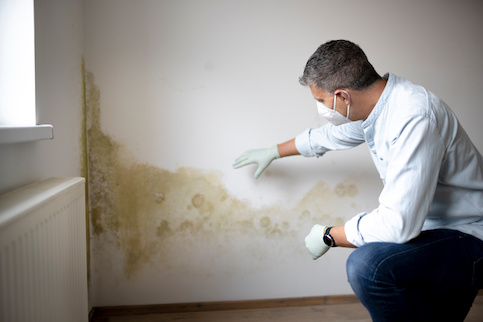You’ve found your dream home. The sellers accepted your offer. All looked good – until your home inspector found mold in the home’s basement.
No buyers want to see the word “mold” on a home inspection report. Mold can cause serious health problems and can be expensive to remove.
This leaves you with a decision: Should you avoid purchasing a home that might be perfect in every other way? Here are five ways to know when to walk away from a house with mold.
Why Buying A House With Mold Can Be Risky
There are always risks with buying a house. Even a thorough home inspection won’t discover every potential problem. But your risk increases when you buy a home with mold.
Mold can cause you and your family serious health issues. Mold spores can lessen the air quality in a home, creating toxic living conditions. Depending on the type of mold in a home, spores can cause sneezing, runny noses, wheezing, headaches and fatigue. People who are exposed to mold for long periods can suffer even more severe allergic reactions.
Mold can also be a sign of serious water damage in a home, a problem that can be expensive to correct. And if you don’t plug up whatever leaks are bringing mold into your home? You’ll struggle to sell your residence in the future.
See What You Qualify For
Buy A Home
Discover mortgage options that fit your unique financial needs.

Refinance
Refinance your mortgage to have more money for what matters.
Tap Into Equity
Use your home’s equity and unlock cash to achieve your goals.
Five Signs You Should Reconsider Buying A Home With Mold
It’s never easy to walk away from a home that you consider a perfect fit for your budget and housing needs. Walking away might also result in a legal battle with the home’s sellers. They might not want to refund the earnest money that you put down after they accepted your offer.
But you also don’t want to live in a home with serious mold problems. When debating whether to walk away from a real estate sale, evaluate the extent of the mold problem and the sellers’ willingness to remove the mold and solve any underlying leaking or flooding issues with the home.
Be aware, too, that homeowners insurance usually doesn’t cover mold remediation unless it is a result of a covered event such as a water pipe that bursts. Your homeowners insurance policy won’t cover the cost of removing mold if that mold is a result of a leaky foundation or flood. This makes it even more important to negotiate a remediation that is paid for by the sellers.
Here are five signs that should give you pause before buying a home with mold.
1. The Home Inspection Found Extensive Mold Growth
After you submit an offer that the sellers approve, you can order a home inspection of the residence that you’re buying. Don’t pass up this opportunity: An inspector will tour your home, looking for problems both big and small. One of these potential problems? Mold.
Your home sale doesn’t have to fall apart even if your home inspector finds mold. Maybe the inspector only found a small amount of mold. That is a problem that might be easily fixed. You can ask the sellers to hire a mold remediation expert to remove the mold. If this happens, and the mold is gone before you move in, you won’t have to worry about long-term health issues.
Be careful, though, if your inspector finds extensive mold growth in the home. This can be a sign of a significant water problem. If the home’s foundation leaks, you could face a hefty repair bill to waterproof it. Same with a home’s roof. Repairing a leaking roof is not cheap. Removing a significant amount of mold can also prove challenging – and expensive.
You might have to consider financing challenges, too. Some lenders, including those offering FHA loans, might not approve your request for a mortgage if the home you’re buying has serious mold issues. You might have to shop around for a lender if the home you’re buying has significant mold issues. That could make buying the home even more stressful.
2. The Seller Won’t Pay For Mold Remediation
Remediating a mold problem is not inexpensive. Though price varies based on the size of the infestation and the type of mold, you can expect to pay from $1,000 to $3,500 to remove mold from a home. More extensive remediations, though, can cost more than $6,000.
If an inspector finds mold damage in the home you want to buy, ask the sellers to hire a remediation expert to resolve the problem. If the sellers refuse, consider walking away. The expense of paying for mold remediation could quickly drain your savings.
3. The Mold Is Highly Toxic Or Hard To Remove
Not all types of molds are equally dangerous, with the Centers for Disease Control and Prevention saying that different types impact people in varying ways.
One of the more potentially dangerous types of mold is Stachybotrys chartarum, often referred to as black mold. Its spores might trigger allergic reactions in some people.
Not every type of black mold is dangerous to all homeowners. But it’s important for owners to call in mold experts to determine the toxicity of any mold they find in their home, including black mold.
Other times, your inspector might find mold growing in hard-to-access places, such as narrow crawlspaces or hidden corners in an attic. If the mold is particularly difficult to reach, remediation experts might charge even more to remove it. Consider the costs of remediation, and whether the sellers are willing to take this on, before closing your home sale.
4. The Seller Didn’t Disclose The Home’s Mold Problem
There are no federal laws requiring sellers to disclose that their home has a mold problem. Many states also don’t require that homeowners include mold issues on the Seller’s Disclosure form listing known problems with a home, though some do.
But the Seller’s Disclosure form is supposed to include any problems a home has with leaks and flooding, issues that can lead to mold. If sellers don’t disclose that they have had a mold issue, even if they are not legally required to do so, you might wonder how many other problems they are not disclosing.
If you are worried that the sellers might be hiding additional problems, you might consider talking to your real estate attorney about possibly walking away from the sale.
5. The Mold Was Caused By Severe Water Damage
Water damage can be devastating to a home. It can cause structural damage that often costs thousands of dollars to repair. It can cause floors to buckle, walls to warp and attic floors to rot away. It can also lead to mold. Water damage is also a frequent cause of mold.
If your inspector finds mold, you should be cautious: It might be caused by water damage. Home repair site Angi estimates that remediating water damage usually costs from $1,305 to $5,703.
This shouldn’t be surprising. The most common causes of water damage are:
- Roofing issues
- Leaking pipes
- Broken appliances
- Basement flooding
None of those issues are cheap to fix, with damaged roofs and flood-prone basements especially expensive to repair.
Take the first step to buy a home.
Quicken Loans® lets you get to house hunting sooner.
When Buying A Home With Mold Might Make Sense
Does this mean that you should never buy a home with mold? Not necessarily. Not all mold is dangerous. And it’s not uncommon for many homes to have some traces of mold.
If you are still interested in buying a home even if an inspector finds mold, speak with your real estate agent and home inspector to determine how serious the problem is. And then consider several factors when determining whether you still want to purchase the residence:
- The mold growth is small or can be easily removed: If the amount of mold in the home is minor and is easy to eliminate, you might not want to walk away from a home that is otherwise a good fit.
- The seller will pay for removal: Even if there is a lot of mold, if the home’s sellers are willing to pay a professional remediation company to remove it, you might still consider moving ahead with the sale. Make sure, though, that the sellers also resolve whatever problem, such as water damage, led to the mold.
- The sellers are willing to lower the asking price: If the mold your inspector discovers isn’t significant and you can hire a remediation service at a modest price, you might be able to negotiate a lower sales price with the sellers to keep the home sale alive.
- The home is otherwise perfect: Maybe the home is a perfect fit for your budget. Maybe it sits in your ideal neighborhood. Or maybe it’s the ideal size and style. You might want to work with sellers to find a solution to the mold problem, maybe one that involves remediation and future mold testing, instead of walking away from the sale.
The Bottom Line�
Mold can be a scary sight for home buyers. And if a home is plagued with serious mold issues, you might want to walk away from it, even if it is otherwise a perfect fit. The key is to talk with your real estate agent and home inspector to determine how serious the mold problem is.

Dan Rafter
Dan Rafter has been writing about personal finance for more than 15 years. He's written for publications such as The Washington Post, Chicago Tribune and Wise Bread.












